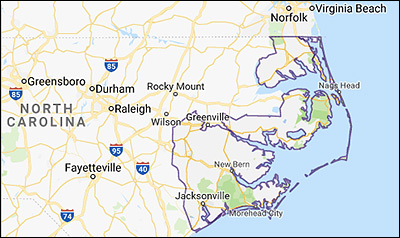By Jim Ellis

North Carolina’s 9th Congressional District

North Carolina’s 3rd Congressional District
The Republican special election nominee, state Rep. Greg Murphy (R-Greenville), is favored to defeat former Greenville mayor Allen Thomas, who won the Democratic nomination outright at the end of April. The latest available polling yielded a low double-digit lead for Murphy.
The 9th District begins in Charlotte, encompassing approximately 20 percent of Mecklenburg County, and continues to annex Union – the most Republican county and largest population entity – Robeson, Richmond, Scotland, and Anson counties along with parts of Cumberland and Bladen. The final county, Bladen, was the site of the voter fraud allegations in the last regular election.
The seat leans Republican but is highly competitive. Democrat Dan McCready, the 2018 nominee, came within 905 votes on the unofficial count, which of course was suspended because evidence yields that much of the margin, if not all and more, was fraudulent.
The special election appears headed toward a tight finish. Many believed that McCready would score a comfortable win at the beginning of the special cycle because he came so close in November, and particularly after he became a consensus unopposed candidate in the special Democratic primary. But, state Sen. Dan Bishop (R-Charlotte) has been a tougher opponent than outside analysts predicted, and this race appears headed to a photo finish tomorrow.
Polling only began surfacing last week, and we see one reported survey with McCready leading, one giving Bishop the advantage, while the third, the latest study from the co/efficient research firm, projects a flat tie.
Harper Polling released the first survey (Aug. 26-28; 551 likely NC-9 special election voters) that found McCready topping Bishop, 51-46 percent, with leaners to both men included. But, the sample included 56 percent females, which suggests at least a slight Democratic skew.
RRH Elections then released their survey during the same period (Aug. 26-28; 500 likely NC-9 special election voters) and it gave Sen. Bishop a one point, 46-45 percent, edge. Finally, co/efficient publicized what will probably be the last public poll (Sept. 5-6; 1,175 likely NC-9 special election voters through a combination of mobile text responses and automated landline interviews) and finds the candidates tied at 44 percent apiece. Yet, even on this poll the female segment is much larger at 55 percent of the total sample.
The crosstabs suggest that the co/efficient poll might have reliability issues. For example, it finds Bishop only getting 50 percent of the white vote, but 25 percent of the black vote, and a majority of Hispanics. The data also shows Sen. Bishop having a significant advantage among those who said they have already cast their ballot through the early voting process.
Both candidates are hitting their opponent on expected topics. Bishop is attacking McCready as being part of the socialist left, associating him with Rep. Alexandria Ocasio-Cortez, House Speaker Nancy Pelosi, and presidential candidates, Sens. Bernie Sanders and Elizabeth Warren.
Conversely, McCready is going on offense over healthcare, and Bishop’s authorship of the controversial gender-based “bathroom law” that in large part led to GOP Gov. Pat McCrory’s defeat in 2016.
It is clear that the race will come down to voter turnout. In the simplest of terms, whichever candidate and their outside allies do the best job of getting their identified voters to the polls will claim victory.
